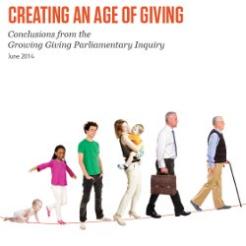Executive role job descriptions should include evidence that business leaders have a track record in supporting social causes, according to a Parliamentary inquiry into growing charitable giving.
The Growing Giving Inquiry was chaired by David Blunkett, the Labour MP for Sheffield Brightside and Hillsborough, Andrew Percy, the Conservative MP for Brigg and Goole, and Liberal Democrat peer Baroness Tyler of Enfield.
It looked at the long-term decline in proportion of households contributing to charity and how to change this.
The final report of the inquiry, entitled Creating an Age of Giving, published today, makes a number of recommendations on increasing charitable giving.
It says businesses should create and promote giving models in the workplace and urges the Institute of Directors to encourage businesses to make sure that executive job descriptions ask for evidence that business leaders are regular supporters of social causes and support a socially responsible corporate culture.
The report also makes a number of recommendations to schools, saying “there is a real need to engage with people at a young age to give them an experience of charity”.
It says schools and charities should work together to ensure that children and young people have opportunities to be involved in the work of charities, and that their participation is recognised and promoted.
It also says UCAS forms should include a provision for young people to demonstrate their commitment to social action.
The report recommends that charities need to engage more with young people. It asks the Small Charities Coalition to build on its existing work to provide a programme for young people to shadow charity trustees; and says the goal should be to create more opportunities at large charities for young people to participate in leadership roles.
Twenty-two year-old Leon Ward, who has been a trustee at Plan UK - the 92nd largest charity in the UK - for four years, and contributed to the inquiry warned that young prospective trustees were "put off by charity sector elitism" in an evidence hearing last year.
Speaking to Civil Society News, he said: “I am encouraged by the inquiry’s recommendation to urge leaders of large charities to embrace younger talent on their boards to help future-proof charities and deal with some of the sectors major strategic challenges.
“I spend a lot of my time sharing my trustee experiences with sector leaders and have found that many are open to younger trustees but often the resistance comes from chairs; I think big charities like Plan UK who lead by example have some really interesting stories to tell and the umbrella groups should support them in telling those stories.”
TV channels should give charities airtime
The report also makes a number of recommendations to government, saying it should mandate that licences for all TV channels should require a modest amount of time committed annually for programming aimed at fostering charitable giving, allowing charities to broadcast at peak times.
It also says government should introduce living legacies to give people more tax-effective ways to give to charity whilst they are still alive.
Blunkett said: “At a time when the recession has left people sceptical of many corporate institutions, we hope that our recommendations will help build trust in business, provide a vital boost for charities and stimulate giving in the workplace.”
The Growing Giving Inquiry was established following the publication of research commissioned by CAF in 2012 showing that fewer households are participating in regular charitable giving.
John Low, chief executive of the Charities Aid Foundation, said: “We are seriously worried about the falling number of households giving to charity, which could result in a big drop in donations in the near future.
“People spend a huge amount of time in the workplace, making it the ideal place to get people to rally together around a cause.
“Businesses, charities and government now need to work together to help create real behavioural change in the UK and embed charity ever more deeply into our culture.”









